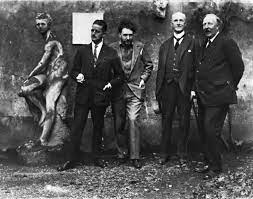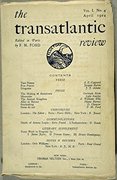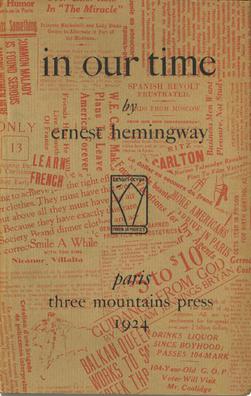English author Ford Madox Ford, 50, is pleased with Volume I, Issue 4, of his magazine, the transatlantic review.
Ford was able to start publishing in January with funding he secured last fall when American lawyer John Quinn, 54, was visiting and they got together with American ex-patriate poet, Ezra Pound, 38.

James Joyce, Ezra Pound, John Quinn and Ford Madox Ford in October of last year
Quinn had sent $500 and promised he would chip in another $500 if necessary, as well as approach some of his wealthy New York friends for additional help.
Pound has also been instrumental in recommending up and coming writers for the literary magazine. The first issue had some of his own work, and a short story by another American ex-pat small publisher Robert McAlmon, 29.
The second issue was so good it was banned by the American Women’s Club of Paris!
Pound also secured a piece from the Irish ex-pat James Joyce, 42, whose novel Ulysses caused such a stir when it was published here two years ago. His “Work in Progress” was supposed to appear in the transatlantic review in January, but the proofs he received were in such bad shape he asked for more time to go over them.

the transatlantic review, April
Actually Joyce has confided to his drinking buddy, McAlmon, that he thinks the magazine is “very shabby.”
A few months ago, Pound introduced Ford to yet another American trying to make a living as a writer, former Toronto Star foreign correspondent Ernest Hemingway, 24, who moved back to Paris from Toronto with his wife and new baby at the beginning of the year.
Ford has hired Ernie to be the magazine’s commissioning editor. Well, “hired” is a bit much. He can’t actually pay him anything. Ford is thinking he may have to make a trip to New York City to beg for more money in person from Quinn, whom he’s heard is quite ill.
Ernie finally convinced Ford to include work in this issue by one of Hemingway’s recent American mentors, Gertrude Stein, 50. He told Stein to give him her epic novel, The Making of Americans, for Ford to serialize. The only copy she had was one that she and her partner, Alice B. Toklas, about to turn 47, had had bound and she didn’t want to let it out of her sight. So Ernie and Alice copied out the first 50 pages in time for the first instalment to appear in this issue. Gertrude and Alice are so excited that this huge work is finally appearing in print somewhere.
Ernest has advised Gertrude in her dealings with Ford:
Be haughty but not too haughty. I made it clear it was a remarkable scoop [getting Making]…obtained only through my obtaining genius. [Ford] is under the impression that you get big prices when you consent to publish…Treat him high, wide and handsome…They are going to have Joyce in the same number.”
Hemingway has one of his own stories in this issue too, “Indian Camp.”
*****
That story is also included in in our time, one of the first volumes published by Three Mountains Press, founded by American journalist Bill Bird, 36, who owns this office space. Ford leases his small share for the magazine from Bird.
Six vignettes and 12 stories by Hemingway appear in in our time—Bird wants to signal how modern it is by not capitalizing the title. Last year Hemingway’s Three Stories & Ten Poems, was published by McAlmon’s Contact Press, and Pound had managed to get six of the stories published in The Little Review’s special “Exiles” issue in the U. S. last October.

in our time by Ernest Hemingway
Bird designed the dust jacket for in our time himself, to make the whole volume seem newsworthy. He also printed it on a handpress with high quality handmade paper. 18 vignettes (six are about bullfighting, Ernie’s latest interest) spread over 31 pages left lots of white space in the layout to make the simple declarative sentences stand out even more.

Ernest Hemingway
The woodcut of the author bled through the paper, so, instead of the 300 copies they printed, they’ve ended up with about 170 good ones to sell. Ernie’s parents back in Oak Park, Illinois, have bought 10.
Ford has been kind enough to give Hemingway’s book an early review in the Paris Herald, praising his “minute but hugely suggestive pictures.”
Hemingway’s work is getting to be known among the literary crowd; he knows he won’t get any payment for any of these publications. He and his wife Hadley, 32, have been living off her trust fund. Although, because it has not been invested well, the fund is starting to decrease, and Ernie has taken some work doing gardening for Parisians.
But Ernie’s not worried. Eventually, there will be money.
“Such Friends”: 100 Years Ago… is the basis for the paperback series, “Such Friends”: The Literary 1920s. Volumes I through IV, covering 1920 through 1923 are available at Thoor Ballylee in Co. Galway, and as signed copies at Pan Yan Bookstore in Tiffin, OH, City Books on the North Side and at Riverstone Books in Squirrel Hill, Pittsburgh, PA. They are also on Amazon.com and Amazon.co.uk in print and e-book formats. For more information, email me at kaydee@gypsyteacher.com.
Mark your calendar! The Greater Pittsburgh Festival of Books returns to the Pittsburgh Theological Seminary in Highland Park on Saturday, May 11. Stop by the “Such Friends” booth in Writers’ Row.
This summer I will be talking about the literary 1920s in Paris and New York at the Osher Lifelong Learning Institute at Carnegie-Mellon University.
Manager as Muse, about Scribner’s editor Maxwell Perkins’ relationships with Hemingway, F. Scott Fitzgerald and Thomas Wolfe, is also available on Amazon.com and Amazon.co.uk in both print and e-book versions.
If you want to walk with me through Bloomsbury, you can download my audio walking tour, “Such Friends”: Virginia Woolf and the Bloomsbury Group.






























